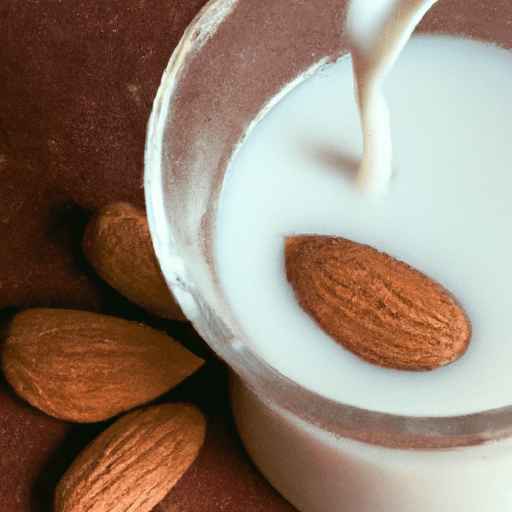Almond Drink: A Creamy and Nutritious Delight
Are you looking for a delicious and nutritious alternative to traditional dairy milk? Look no further than almond drink! This creamy and nutty beverage has gained incredible popularity in recent years, thanks to its exceptional taste and versatility in cooking. In this blog post, we will explore the world of almond drink and uncover its delightful flavors, common culinary uses, remarkable nutritional benefits, and interesting historical background.
A Symphony of Flavors
Almond drink boasts a delicate and creamy texture, accompanied by a subtly sweet and nutty taste. Made from almonds and water, this beverage beautifully balances the nuttiness of almonds with a refreshing and light flavor. The result is a satisfying drink that can be enjoyed on its own or incorporated into various recipes.
From Breakfast to Dessert: Culinary Uses
Almond drink offers a wide array of culinary possibilities. Its versatility allows it to seamlessly blend with both sweet and savory dishes, creating a creamy and nutty flavor profile. Here are some common uses of almond drink in cooking:
Smoothies and Shakes: Add a splash of almond drink to your favorite smoothie or shake recipes for a creamy and nutritious boost.
Baking: Replace traditional dairy milk with almond drink in your baking creations, such as cakes, cookies, and muffins. Its subtle nutty flavor adds a delightful twist to your baked goods.
Hot Beverages: Enjoy a comforting cup of hot chocolate or a frothy latte by substituting almond drink for regular milk. The nutty undertones create a unique and enjoyable experience.
Sauces and Dressings: Almond drink acts as an excellent base for creamy sauces and dressings. From pasta sauces to salad dressings, it adds a rich and smooth element to your culinary creations.
Dairy-Free Alternatives: For those with lactose intolerance or following a plant-based diet, almond drink is a wonderful substitute for traditional dairy milk in various recipes.
A Nutritional Powerhouse
Not only is almond drink delicious and versatile, but it also offers numerous health benefits. It is naturally low in calories, making it an excellent choice for those watching their waistline. Additionally, almond drink is packed with essential nutrients, including:
Protein: Almonds are a fantastic source of plant-based protein. Enjoying almond drink can help you meet your daily protein needs.
Vitamin E: Almonds are rich in vitamin E, a powerful antioxidant that supports healthy skin, hair, and immune function.
Calcium: Almond drink is fortified with calcium, providing a dairy-free option for those seeking to strengthen their bones and teeth.
Healthy Fats: Almonds are high in unsaturated fats, which help promote heart health and reduce bad cholesterol levels.
A Glimpse into Almond Drink’s History
The consumption of almond-based beverages dates back centuries, with early records tracing its origins to the Middle East. In medieval Europe, almond milk gained popularity as a substitute for animal milk during fasting periods. Over time, traditional almond milk evolved into the almond drink we know and love today.
Conclusion
Almond drink is not only a delicious and versatile alternative to dairy milk but also a nutritional powerhouse. Its creamy texture, nutty flavor, and numerous culinary uses make it an excellent addition to your kitchen pantry. Whether enjoyed on its own, in a smoothie, or incorporated into baking and cooking, almond drink offers a delightful treat for your taste buds. So why not give it a try and embrace the creamy goodness of almond drink today?
Note: Almond drink can be easily found in grocery stores or made at home using almonds and water. Be sure to check the ingredient list for any additional flavors or sweeteners, depending on your preferences.
Almond Drink
Origin and Historical Significance: Almond drink, also known as almond milk, has been consumed for centuries and has roots in the Middle East and Mediterranean regions. It is believed that almond milk was a staple in medieval kitchens and was enjoyed by various cultures, including the Romans. Over time, its popularity spread to Europe and eventually to other parts of the world.
Common Uses: Almond drink is a dairy-free alternative to traditional milk and is commonly used as a substitute in cooking and baking. It can be found in various recipes such as smoothies, sauces, curries, and desserts. Almond drink is also enjoyed on its own as a refreshing beverage.
Nutritional Benefits: Almond drink is often chosen for its nutritional benefits. It is naturally lactose-free, making it suitable for those with lactose intolerance or milk allergies. It is low in calories and contains no cholesterol. Almond drink is a source of vitamin E, which is known for its antioxidant properties. It also contains minerals such as calcium, potassium, phosphorus, and magnesium.
Unique Properties: Almond drink has a mild, slightly nutty flavor and a creamy texture. It can be made at home by blending soaked almonds with water and straining the mixture. Store-bought almond drink often contains added vitamins and minerals to enhance its nutritional profile. Unlike cow’s milk, almond drink is naturally free from saturated fat. However, it generally has a lower protein content compared to dairy milk.
Environmental Impact: Almond drink production has gained attention in recent years due to its impact on water resources. Almonds require significant amounts of water to grow, and since almond drink production requires a large number of almonds, it indirectly contributes to water usage. However, it is worth noting that the specific impact varies depending on the region where almonds are cultivated and the water management practices employed.
Culinary Innovations: Almond drink has inspired culinary innovations such as almond-based cheeses, ice creams, and yogurts. These products cater to lactose-intolerant individuals or those seeking plant-based alternatives. The versatility and neutral taste of almond drink have made it a popular choice for experimenting with new plant-based recipes.




Use the share button below if you liked it.
It makes me smile, when I see it.